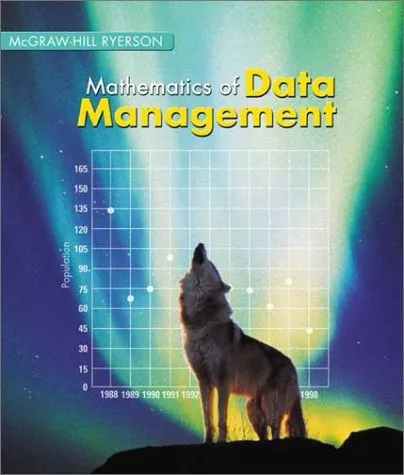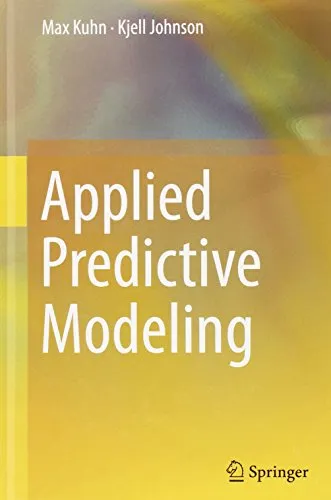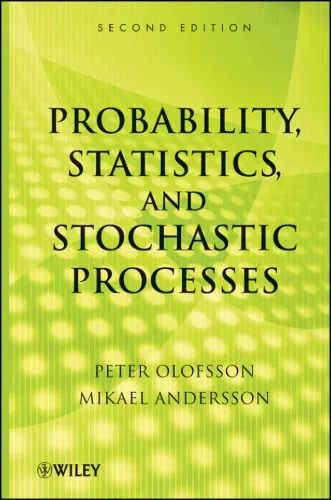Mathematics of Data Management
4.6
Reviews from our users

You Can Ask your questions from this book's AI after Login
Each download or ask from book AI costs 2 points. To earn more free points, please visit the Points Guide Page and complete some valuable actions.Related Refrences:
Welcome to the detailed introduction of Mathematics of Data Management, an essential resource authored to explore the intricate and fascinating relationship between mathematics and data analysis. This book has been carefully crafted to approach data management through mathematical principles, making it an indispensable guide for students, educators, data scientists, and problem-solvers who aim to excel in quantitative reasoning and critical thinking. In the upcoming sections, we’ll provide you with an overview of the book’s contents, discuss its key insights, share memorable quotes, and explain why this book plays a vital role in today’s data-driven world.
Detailed Summary of the Book
Mathematics of Data Management emphasizes the practical and theoretical approaches to understanding, analyzing, and managing data systematically. The book begins by introducing readers to the foundational concepts of data collection, organization, and visualization. It then delves deeper into topics such as probability, statistical distributions, permutations, combinations, and various data-driven models. These topics serve as the backbone for analyzing trends, making predictions, and determining probabilities in complex scenarios.
One of the distinctive features of this book is its task-oriented structure. Each chapter provides numerous real-world applications, problems, and case studies that allow readers to learn by doing. Whether it's calculating the likelihood of an event occurring or assessing the efficiency of a dataset, the book equips readers with the mathematics needed to bring order and insight to data management problems.
Furthermore, special attention is paid to the ethical considerations in data handling, including discussions on privacy, biases, and accountability in the collection and use of data. By the end of the book, readers will have a comprehensive understanding of how mathematical principles guide effective decision-making in the realm of big data, artificial intelligence, and everyday problem-solving.
Key Takeaways
- Understanding the fundamental principles of data organization, representation, and visualization.
- Learning advanced mathematical techniques such as probabilities, combinatorics, and statistical reasoning for data-driven decisions.
- Applying real-world applications and case studies to reinforce theoretical knowledge.
- Recognizing the importance of ethics in data management and avoiding biases.
- Building a strong foundation for academic and professional fields related to machine learning, artificial intelligence, and large-scale data analysis.
Famous Quotes from the Book
"Data tells a story, but mathematics provides the voice to express that story with clarity and precision."
"It’s not just about managing data; it’s about drawing actionable insights while respecting the human aspect of those numbers."
"Probability is the compass that guides us through uncertainty, leading to informed choices and better decisions."
Why This Book Matters
In today’s world, data is ubiquitous—every click, transaction, and interaction generates a trail of information. However, understanding and managing this data goes far beyond mere collection; it requires tools, techniques, and a thoughtful approach. Mathematics of Data Management addresses this need by equipping readers with the skills to analyze, interpret, and apply data strategically and responsibly.
The book bridges the gap between theory and practice by presenting rigorous mathematical concepts alongside real-world applications. It is not just confined to classrooms; the knowledge imparted is relevant for anyone working in analytics, finance, epidemiology, software development, or any field dependent on data-driven insights. Furthermore, it underscores ethical principles, which are critical for ensuring trust and accountability in an increasingly data-centric world.
Through its comprehensive approach, this book inspires its readers to see mathematics not just as a set of abstract principles but as a vital tool for navigating and thriving in today’s information age. Whether you are a student laying the foundation for a career or a professional seeking to enhance your analytical skills, Mathematics of Data Management is a timely and invaluable addition to your library.
Free Direct Download
You Can Download this book after Login
Accessing books through legal platforms and public libraries not only supports the rights of authors and publishers but also contributes to the sustainability of reading culture. Before downloading, please take a moment to consider these options.
Find this book on other platforms:
WorldCat helps you find books in libraries worldwide.
See ratings, reviews, and discussions on Goodreads.
Find and buy rare or used books on AbeBooks.
1312
بازدید4.6
امتیاز0
نظر98%
رضایتReviews:
4.6
Based on 0 users review
Questions & Answers
Ask questions about this book or help others by answering
No questions yet. Be the first to ask!














